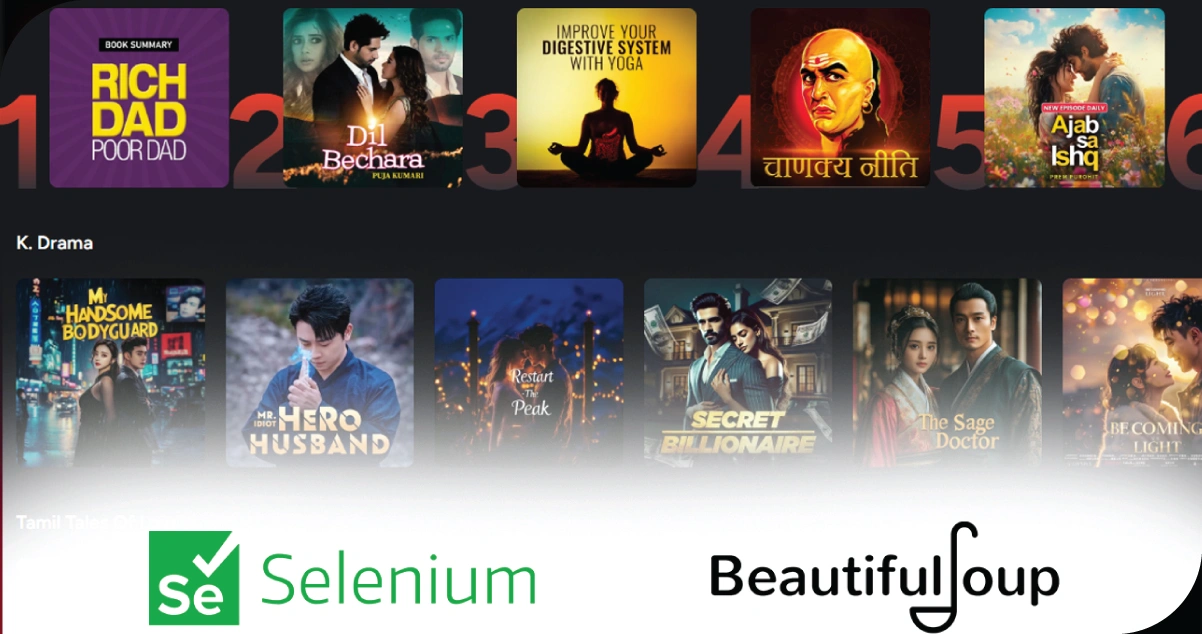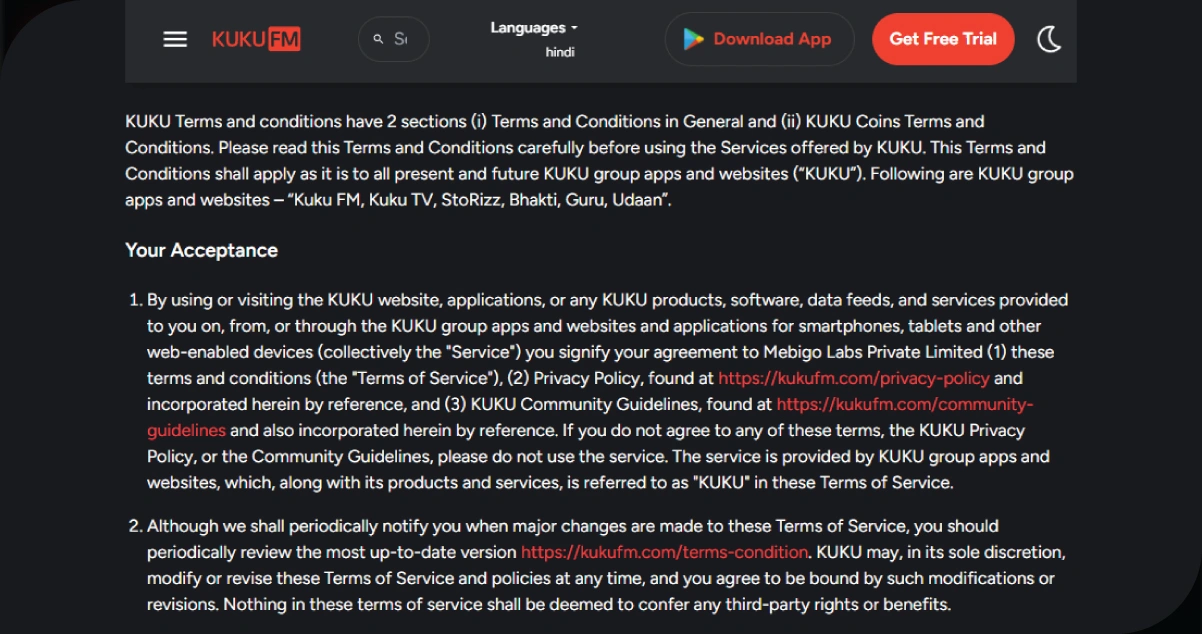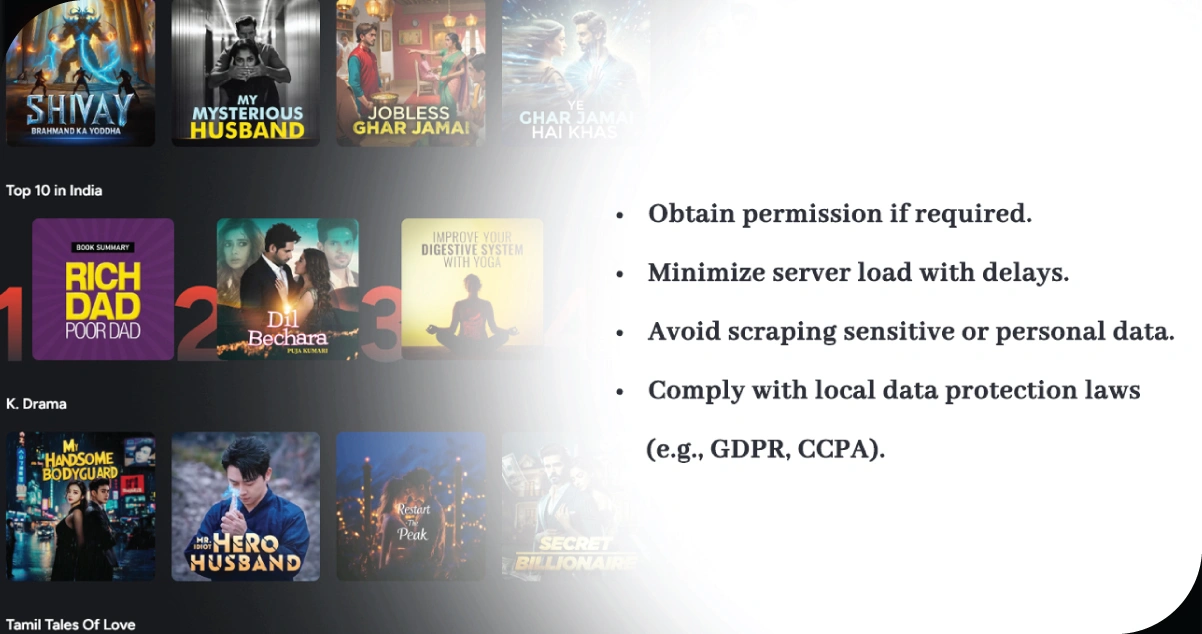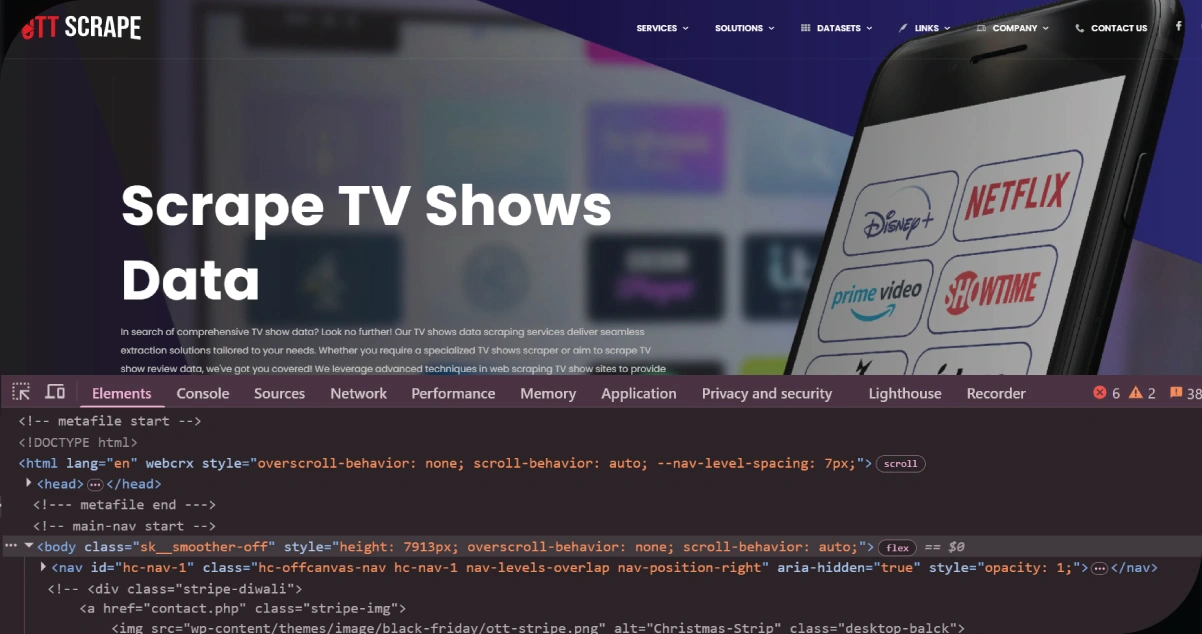
Introduction
The digital age has transformed how we consume media, with streaming platforms like Kuku TV offering vast content libraries. For developers, researchers, or data enthusiasts, extracting data from such platforms can unlock valuable insights, from content trends to user preferences. This blog explores how to scrape data from Kuku TV using BeautifulSoup and Selenium, two powerful Python libraries. We'll cover the tools, techniques, and ethical considerations, ensuring you're equipped to tackle Scraping Kuku TV Shows & Movies with Python responsibly and effectively. Additionally, we'll dive into the process of Scraping Kuku TV Shows & Movies with BeautifulSoup to help you get started with data extraction from the platform.
Understanding Web Scraping and Its Relevance

Web scraping involves extracting data from websites and transforming unstructured HTML into structured formats like CSV or JSON. For a platform like Kuku TV, scraping can help gather details such as show titles, genres, ratings, or release dates. This data can fuel recommendation systems, market analysis, or academic research.
Why BeautifulSoup and Selenium?

- BeautifulSoup: Ideal for parsing static HTML, BeautifulSoup excels at navigating and extracting data from web pages. It's lightweight and perfect for straightforward scraping tasks.
- Selenium: Designed for dynamic websites, Selenium automates browser interactions, handling JavaScript-rendered content that BeautifulSoup can't process alone.
- Combined Power: Together, they tackle static and dynamic elements, making them a perfect duo for scraping Kuku TV's complex interface.
Setting Up Your Environment
Before diving into code, let's prepare the tools and environment.
Prerequisites
- Python 3.x: Install Python (download from python.org).
- Libraries:
- Install BeautifulSoup: pip install beautifulsoup4
- Install Selenium: pip install selenium
- Install Requests: pip install requests (for fetching pages)
- Web Driver: Selenium requires a browser driver (e.g., ChromeDriver for Google Chrome). Download it from the official site and add it to your system's PATH.
- IDE: Use an IDE like VS Code or PyCharm for coding.
Ethical Considerations

Scraping Kuku TV (or any website) comes with responsibilities:
- Terms of Service: Check Kuku TV's terms to ensure scraping is permitted. Unauthorized scraping may violate policies.
- Rate Limiting: Avoid overwhelming servers by adding delays between requests.
- Data Privacy: Respect user data and avoid collecting personal information.
Step-by-Step Guide to Scraping Kuku TV
Let's explore how to extract show titles, genres, and ratings from Kuku TV. Assuming Kuku TV's website features static and dynamic content, we can use BeautifulSoup to parse static elements like show titles and genres. At the same time, Selenium can help us retrieve dynamic content such as ratings. By leveraging these powerful tools, you can gather essential data efficiently. For businesses or researchers looking to streamline this process, utilizing Kuku TV Shows & Data Scraping Services can provide structured insights, saving time and ensuring data accuracy. This approach unlocks valuable information for content analysis and decision-making.
Step 1: Fetching the Page with Selenium
Kuku TV's content may load dynamically via JavaScript, so we'll use Selenium to render the page entirely.
from selenium import webdriver
from selenium.webdriver.chrome.service import Service
from webdriver_manager.chrome import ChromeDriverManager
import time
# Set up Selenium WebDriver
driver = webdriver.Chrome(service=Service(ChromeDriverManager().install()))
# Navigate to Kuku TV's shows page
url = "https://www.kukutv.com/shows"
driver.get(url)
# Wait for dynamic content to load
time.sleep(3)
# Get the page source
page_source = driver.page_source
# Close the browser
driver.quit()
Explanation:
- webdriver.Chrome initializes a Chrome browser instance.
- ChromeDriverManager automatically handles driver installation.
- time.sleep(3) ensures JavaScript content loads before scraping.
Step 2: Parsing HTML with BeautifulSoup
With the page source, BeautifulSoup can parse the HTML to extract data.
from bs4 import BeautifulSoup
# Parse the page source with BeautifulSoup
soup = BeautifulSoup(page_source, 'html.parser')
# Find all show containers (adjust selector based on Kuku TV's HTML)
show_containers = soup.find_all('div', class_='show-card')
# Lists to store data
titles = []
genres = []
ratings = []
# Extract data from each show
for show in show_containers:
# Extract title
title = show.find('h2', class_='show-title').text.strip()
titles.append(title)
# Extract genre
genre = show.find('span', class_='genre').text.strip()
genres.append(genre)
# Extract rating
rating = show.find('span', class_='rating').text.strip()
ratings.append(rating)
Explanation:
- BeautifulSoup(page_source, 'html.parser') creates a parseable object.
- find_all locates all elements matching the specified tag and class.
- Adjust class names (show-card, show-title, etc.) based on Kuku TV's actual HTML structure.
Step 3: Handling Pagination
Kuku TV likely spreads content across multiple pages. Selenium can automate clicking "Next" buttons or incrementing page URLs.
base_url = "https://www.kukutv.com/shows?page="
page_num = 1
max_pages = 5 # Adjust as needed
while page_num <= max_pages:
# Navigate to page
driver = webdriver.Chrome(service=Service(ChromeDriverManager().install()))
driver.get(f"{base_url}{page_num}")
time.sleep(3)
# Parse page
soup = BeautifulSoup(driver.page_source, 'html.parser')
show_containers = soup.find_all('div', class_='show-card')
for show in show_containers:
title = show.find('h2', class_='show-title').text.strip()
genre = show.find('span', class_='genre').text.strip()
rating = show.find('span', class_='rating').text.strip()
titles.append(title)
genres.append(genre)
ratings.append(rating)
driver.quit()
page_num += 1
Explanation:
- The loop iterates through pages by appending page_num to the base URL.
- Each page is processed similarly to Step 2.
- Add error handling (e.g., for missing elements) to the production code.
Step 4: Saving Data
Store the extracted data in a structured format like CSV.
import pandas as pd
# Create a DataFrame
data = {'Title': titles, 'Genre': genres, 'Rating': ratings}
df = pd.DataFrame(data)
# Save to CSV
df.to_csv('kukutv_shows.csv', index=False)
print("Data saved to kukutv_shows.csv")
Explanation:
- pandas.DataFrame organizes data into a table.
- to_csv exports the data to a file for further analysis.
Advanced Techniques
Handling Dynamic Filters
Kuku TV may allow filtering shows by genre or rating. Selenium can interact with dropdowns or buttons to scrape filtered results.
from selenium.webdriver.support.ui import Select
driver = webdriver.Chrome(service=Service(ChromeDriverManager().install()))
driver.get("https://www.kukutv.com/shows")
# Select genre filter (e.g., "Comedy")
genre_dropdown = Select(driver.find_element_by_id('genre-filter'))
genre_dropdown.select_by_visible_text('Comedy')
# Wait for page to update
time.sleep(3)
# Parse filtered results
soup = BeautifulSoup(driver.page_source, 'html.parser')
# Continue extraction as before
driver.quit()
Error Handling
Robust scraping requires handling missing elements or network issues. for show in show_containers:
try:
title = show.find('h2', class_='show-title').text.strip()
except AttributeError:
title = "N/A"
try:
genre = show.find('span', class_='genre').text.strip()
except AttributeError:
genre = "N/A"
try:
rating = show.find('span', class_='rating').text.strip()
except AttributeError:
rating = "N/A"
titles.append(title)
genres.append(genre)
ratings.append(rating)
Optimizing Performance
- Headless Mode: Run Selenium without a visible browser to save resources.
- options = webdriver.ChromeOptions()
- options.add_argument('--headless')
- Rate Limiting: Add delays (time.sleep(2)) to avoid server bans.
- Parallel Processing: Use libraries like multiprocessing for large-scale scraping.
driver = webdriver.Chrome(service=Service(ChromeDriverManager().install()), options=options)
Challenges and Solutions
JavaScript-Heavy Pages
If Kuku TV relies heavily on JavaScript, Selenium is essential. Ensure time.sleep is sufficient for content to load, or use Selenium's WebDriverWait for explicit waits.
from selenium.webdriver.support.ui import WebDriverWait
from selenium.webdriver.support import expected_conditions as EC
from selenium.webdriver.common.by import By
WebDriverWait(driver, 10).until(EC.presence_of_element_located((By.CLASS_NAME, 'show-card')))
Anti-Scraping Measures
Kuku TV may employ CAPTCHAs or IP blocking. Solutions include:
- Proxies: Rotate IP addresses using services like ScrapingBee.
- User-Agent Rotation: Modify Selenium's user-agent to mimic different browsers.
- CAPTCHA Solvers: Use third-party services (ethically and legally).
Ethical and Legal Considerations

Scraping isn't just a technical task—it's a responsibility. Always:
- Obtain permission if required.
- Minimize server load with delays.
- Avoid scraping sensitive or personal data.
- Comply with local data protection laws (e.g., GDPR, CCPA).
How OTT Scrape Can Help You?

- Multi-Tool Integration: We combine powerful scraping tools like BeautifulSoup, Selenium, and Scrapy to seamlessly handle static and dynamic content and ensure comprehensive data extraction.
- AI-Powered Data Structuring: Our services use AI algorithms to structure raw data, transforming it into easily digestible insights that drive better content analysis and strategy decision-making.
- Real-Time Data Extraction: By leveraging cloud-based infrastructure, we offer real-time data scraping from multiple OTT platforms, allowing businesses to monitor trends and make timely decisions.
- Scalable Solutions: Our scraping technology is highly scalable and capable of handling large volumes of data from multiple OTT platforms without compromising speed or accuracy.
Ethical and Compliant Scraping
We prioritize ethical scraping by adhering to platform policies, ensuring compliance with terms of service, and following best practices to avoid data misuse.
Conclusion
Scraping Kuku TV with BeautifulSoup and Selenium is an effective method for gathering valuable data. BeautifulSoup excels at parsing static HTML content, while Selenium handles dynamic web pages rendered by JavaScript. By combining these tools, you can Extract Kuku TV Content with BeautifulSoup, gaining insights into viewership trends, content preferences, and user engagement.
This approach allows you Scraping Data from Kuku TV Shows & Movies in-depth, whether for content analysis, trend monitoring, or building personalized recommendation engines.
It's important to start small, test your code thoroughly, and scale responsibly. Always be mindful of ethical scraping practices, respect platform terms of service, and use the data responsibly.
These tools unlock endless possibilities for data-driven decision-making in the streaming space.
Embrace the potential of OTT Scrape to unlock these insights and stay ahead in the competitive world of streaming!
